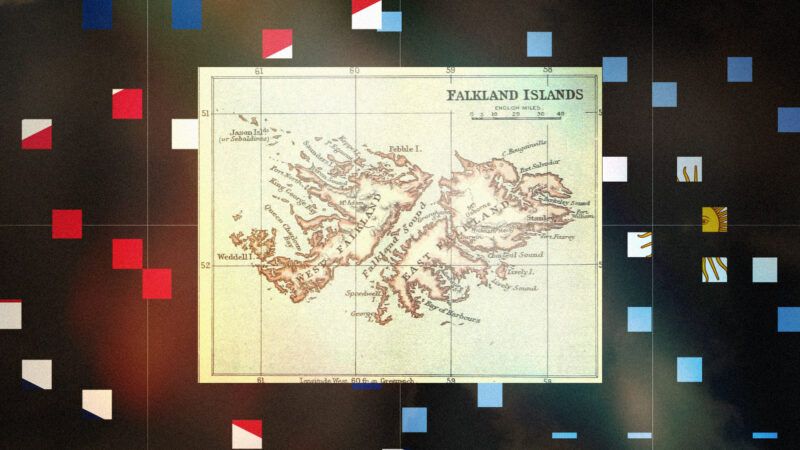Milei Wants Argentina To Take Back the Falkland Islands
The government says it's about sovereignty. It might be about oil, too.

Argentine President Javier Milei announced his intentions to restore Argentina's sovereignty over the Falkland Islands, adding new fuel to a decadeslong territorial conflict.
Argentina's Ministry of Foreign Affairs said in a statement last week that the country would reaffirm its "lawful and indefeasible sovereignty rights over the Falkland Islands, South Georgia, and the South Sandwich Islands and their adjacent maritime areas," saying that the United Kingdom has forcefully invaded the islands for more than 190 years.
Located near the southern tip of Argentina, the Falkland Islands have long been the subject of a territorial dispute between the United Kingdom and Argentina. Currently classified as a British Overseas Territory, the islands are technically self-governing, with foreign affairs and defense matters handled by the British government. The majority of the islands' 3,000 inhabitants are of British descent, and English is the primary language.
Argentina, however, disputes British claims, arguing that it inherited the islands from the Spanish crown in the early 1800s. During his electoral campaign, Milei vowed to "exhaust all diplomatic channels so that the [Falkland Islands] become Argentine again."
"We have to see how we are going to get them back. It is clear that the war option is not a solution. We had a war, which we lost. Now we have to make every effort to recover the islands through diplomatic channels," Milei said during a televised address last November.
Last week, Milei took a step forward by requesting the resumption of bilateral negotiations with the U.K. "to find a solution to this sovereignty dispute, in accordance with the provisions of the relevant resolutions of the United Nations General Assembly." And on Wednesday, the Argentine Foreign Ministry appointed a new secretary of the Falklands, South Atlantic, and Antarctica to lead the negotiations.
The conflict traces back to 1765, when the British claimed and settled the uninhabited islands, only to be expelled by the Spanish a few years later. In 1820, a newly independent Argentina asserted sovereignty over the Falklands. Since then, the islands' sovereignty has been disputed by the two countries.
The most significant escalation occurred in 1982, when Argentina's military invaded the islands, leading to a war with the United Kingdom. Although the U.K. emerged victorious, nearly 1,000 lives were lost and diplomatic ties between the two countries were temporarily severed. In 2009, the Falkland Islands established a new constitution, which "enhanced local democracy, internal self-government and enshrines the right of self-determination."
Argentina's interest in the islands may appear primarily historical—after all, even the Argentine Constitution explicitly declares that "the recovery of said territories and the full exercise of sovereignty" remains "a permanent and non-renounceable objective of the Argentine people." But a closer look shows that there may be additional interests at play.
Before the war, the archipelago was at risk of economic collapse. Since then, its revenues have increased by 500 percent. Its GDP per capita in 2022 was as high as that of Norway, Switzerland, or Monaco.
Currently, the driver of the islands' GDP is the thriving fishing industry. But the discovery of significant oil reserves in nearby deep-sea regions holds the promise for a substantial economic transformation in the near future. Declassified British government documents show that the U.K. has historically been interested in exploiting the oil around the islands.
The British government has responded to Milei's comments by declaring the Falkland Islands' sovereignty "non-negotiable," reiterating that the issue "has been settled for some time and will not change."
The residents of the Falkland Islands expressed their desire to maintain their affiliation with the United Kingdom. In a 2013 referendum, 99.8 percent of islanders voted to remain a British territory. "We will live in freedom under the government of our choice," said Mark Pollard, speaker of the Legislative Assembly of the Falkland Islands.


Show Comments (131)